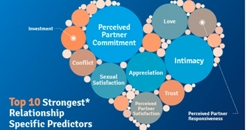 What are the strongest relationship satisfaction factors?
What are the strongest relationship satisfaction factors?
From an article by Institute of Family Studies
What factors are most strongly associated with relationship satisfaction?
A study looked at longitudinal data from 11,000 couples, examining something people are forever interested in- what predicts how relationships are doing now and in the future, in other words which characteristics were most strongly associated with satisfaction?
The authors examined a huge number of variables, classifying them in the following three groups:
-
Partner 1’s perceptions of the relationship.
-
Partner 2’s perceptions of the relationship.
-
Partner 1’s and partner 2’s individual characteristics
The first two categories include measures of things, such as affection, appreciation, conflict, empathy, aggression, sexual satisfaction, supportiveness, along with characteristics, like living together, marriage, duration of the relationship, and so much more. The third category was comprised of characteristics of the individuals, including personality factors, anxiety, attachment, alcohol use, family history, and demographic characteristics.
Not surprisingly, the primary take-away was “It’s not who you’re with, but the dynamic you have with them.” How a relationship goes will be very much related to who you choose; not any random partner will make you happy, but the experience of the relationship is what matters most for satisfaction.
Personality characteristics explained very little about relationship satisfaction. Many people think what they need is to find is a good match on personality, but that’s just not true. The suggestion is that similarity does not matter nearly as much as being with a person who has a type of personality that you enjoy being around. For some people, the last thing they want is to be with someone a lot like them; others want exactly that.
Across everything studied, the top variables that explained the most variance for both present and future relationship satisfaction were these:
-
Perceived partner commitment, which ranked at the top of the list
-
Intimacy
-
Appreciation
-
Sexual satisfaction
-
Love
-
Perceived partner satisfaction
-
Perceived partner responsiveness
-
Conflict
-
Trust
-
Investment
Do you perceive your partner to be highly committed to you? Do you appreciate your partner? A large part of the story of relationship satisfaction is explained by how satisfied or committed (and a host of other things) you believe your partner to be.
Another study showed that in the time leading up to people marrying, ever perceiving one’s partner to be less committed than oneself—even a little bit - was one of the best predictors of unhappiness in marriage - asymmetrical commitment. It may be particularly important for a person searching for a mate to carefully consider what truly signifies commitment.
For those who have a commitment to someone already, say, in marriage, the advice is a bit different: Do not spend a lot of time wishing your partner was different on things like personality or education or political views. Focus, instead, on what you can do to make the dynamic between the two of you as good as it can be. That is going to mean looking for levers you can pull to make a difference (such as listening more to your partner or being more emotionally supportive)—not waiting around for your partner to change.
Read full article here.
Retweet about this article:
From an article by Institute of Family Studies, 08/02/2022